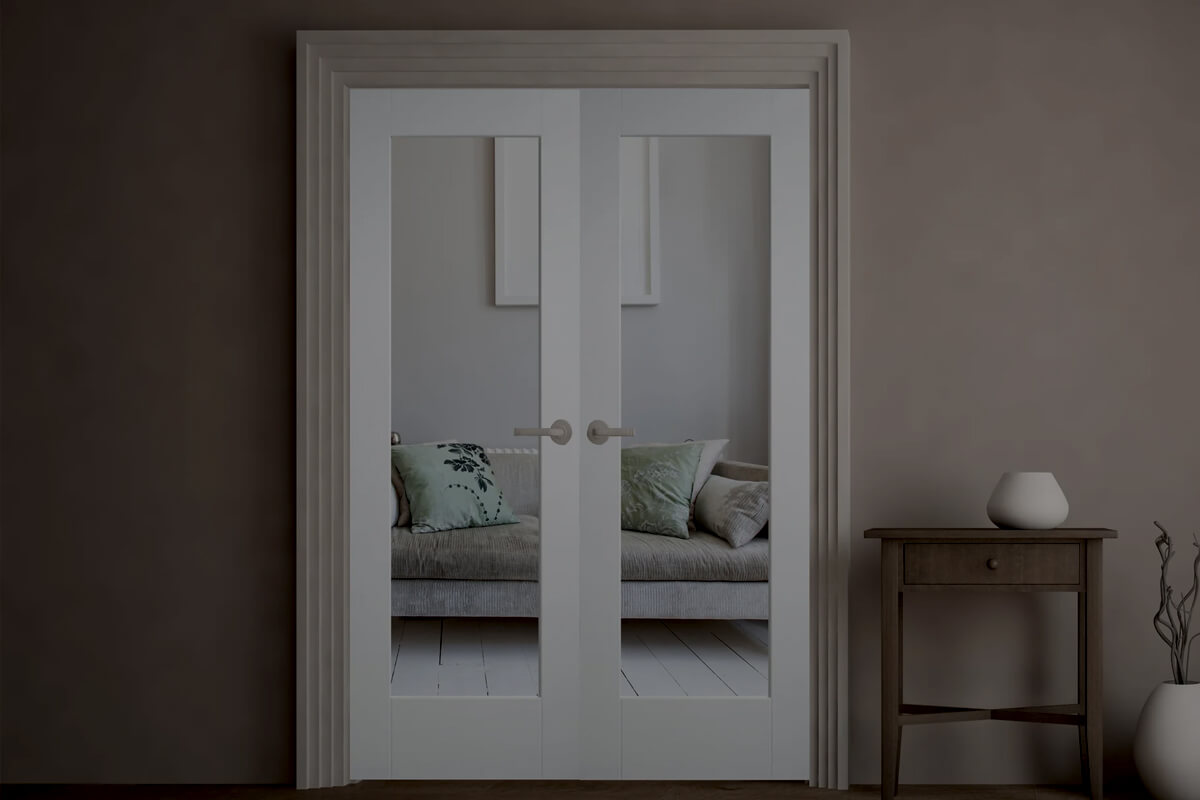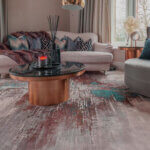Glazed internal doors combine glass panels with door frames to bring natural light between rooms while maintaining distinct spaces. These doors offer enhanced brightness, visual connectivity, and style options from clear to frosted glass, transforming home interiors with both function and elegance.
- Benefits of Glazed Internal Doors
- Types of Glazing and Glass Options
- Choosing the Right Style for Your Room
- Technical Specs: Sound Reduction and Safety Compliance
- Pricing and Installation Costs for Contemporary Interior Portals
- Modern Design Systems: From Historical Glazing to Smart Technology
- Professional Installation and Maintenance
Benefits of Glazed Internal Doors
Glazed internal doors deliver three key advantages. They flood rooms with natural light, reduce your electricity bills, and create spacious feelings even in compact homes.
Enhanced natural light flow ranks as the primary benefit homeowners love. Light travels freely between rooms, brightening previously dark hallways and creating an open atmosphere. You’ll notice reduced need for artificial lighting during daytime hours. Visual connectivity maintains flow between spaces while preserving room boundaries. Parents can monitor children in adjacent rooms, and families stay connected during daily activities. Modern homes especially benefit from this seamless indoor experience that makes spaces feel larger and more welcoming. Glass panels allow for the flow of light between rooms and create an open, airy feel, which is especially important in smaller spaces.
Types of Glazing and Glass Options
Clear glazed doors provide maximum light transmission and unobstructed views between rooms. Frosted glass offers privacy while still allowing light to pass through, creating a soft, diffused glow.
Safety glazed doors use toughened or laminated glass that meets UK building regulations. All doors with glass within 1,500mm of floor level must use safety glass, while glass panels less than 250mm wide can use 6mm glass or laminated glass instead of toughened glass. Acoustic glass provides sound reduction capabilities, with performance ratings typically between 35-42dB. Low-iron glass delivers superior clarity by removing the green tint found in standard glass. Patterned glass adds decorative elements while maintaining privacy, featuring designs from geometric patterns to traditional beveled edges.
Modern Glass Innovations
Self-cleaning glass reduces maintenance with special coatings that break down dirt. Acoustic glass doors achieve impressive sound insulating performance up to 42dB (Rw) for offices and meeting rooms requiring confidential discussions. Smart glass technology represents the newest innovation, with electrochromic windows that can tint automatically to reduce glare and heat during sunny days. These intelligent glazing systems (hypernym) switch between transparent and opaque states on demand, offering dynamic opacity control (rare attribute).
Choosing the Right Style for Your Room
Different rooms demand specific glazing approaches. French glass doors work perfectly for living areas and dining rooms, creating elegant transitions between entertaining spaces.
Kitchens benefit from half glazed internal doors that allow light while concealing cooking mess. Bedrooms need frosted glass or obscure glazed internal doors for privacy during sleep hours. Office spaces require acoustic glass doors rated between 35–37dB (Rw) for standard meeting rooms and 38–42dB (Rw) for executive offices and boardrooms. Bathrooms demand safety glass due to slip risks on wet surfaces. Clear glazed doors excel in hallways and corridors where maximum light flow matters most. Interior glass doors (synonym) serve as essential architectural elements (holonym) within modern home design schemes (connotation).
Technical Specs: Sound Reduction and Safety Compliance
Sound reduction performance varies significantly between glazing types. Standard internal doors provide only 20dB soundproofing, while acoustic glass doors achieve much higher ratings.
34dB sound reduction makes loud conversation quiet and muffled, while 44dB reduction renders loud conversation almost inaudible. Glass panel doors with proper sealing and acoustic materials in frames deliver professional-grade noise reduction. The glass panes (meronym) within these door assemblies (holonym) create effective sound barriers (semantically related entity). UK safety regulations require toughened glass or laminated glass in all doors where glass is within 1,500mm of floor level. Safety glazing must display permanent marking in accordance with BS6206, with toughened glass marked BS EN 12150 and laminated glass marked BS EN 14449.
Pricing and Installation Costs for Contemporary Interior Portals
Glazed internal doors range from budget-friendly to premium options. Partially glazed doors cost £100–£300, while doors with full glass glazing range from £200 to £600 depending on glass quality and door materials.
Installation costs for glazed doors run between £100 and £250 per door due to careful handling requirements. Oak glazed doors command premium prices while pine glazed doors offer budget-friendly alternatives. Pre-finished options cost more upfront but save installation time. Hollow core glazed doors start around £75-£90, while solid core engineered doors reach £245-£575 for pairs. Fire-rated glazed doors carry additional costs but provide essential safety compliance. The door hardware (meronym) and glazing materials (meronym) constitute the main cost components.
Modern Design Systems: From Historical Glazing to Smart Technology
Crittall interior doors lead current design trends with their distinctive steel frames and industrial aesthetic. These steel-framed doors create striking focal points while maintaining slim profiles that maximize glass area. The term “glazed” derives from the Middle English “glasen,” meaning to fit with glass—a craft tradition (etymology) now enhanced by modern technology.
Slide and turn doors offer space-saving alternatives to traditional hinged designs. Bi-fold glazed doors fold back completely to create wide openings between rooms. Contemporary glazed doors feature clean lines and minimal frames that suit modern interiors. Black slimline glazed doors are an increasingly popular choice, taking inspiration from the urban industrial trend. Traditional Victorian glazed doors with bevelled glass panels remain popular for period properties. Pattern 10 and Manhattan styles deliver popular contemporary options with geometric glazing patterns. Shaker design glazed doors blend traditional styling with modern functionality.
Smart Glass Integration and Future Trends
Smart internal doors are equipped with advanced locking systems, such as keyless entry, fingerprint scanners, or voice-controlled operation. Smart glass doors (semantically related entity) featuring Polymer Dispersed Liquid Crystal (PDLC) technology transition glass between clear and opaque with the press of a button or voice command. These intelligent door systems represent the pinnacle of architectural innovation (common attribute), contrasting sharply with solid wood doors (antonym) that block all light transmission.
Professional Installation and Maintenance
Glass internal doors require careful installation due to weight and fragility considerations. Professional fitting ensures proper alignment, weatherproofing, and safety compliance. White glazed internal doors have become a lifestyle statement, offering a blend of aesthetics and functionality that’s hard to ignore.
Toughened safety glass installation demands expertise in handling and securing heavy panels. Acoustic glass systems need precise sealing around perimeters to maintain sound ratings. Regular maintenance involves cleaning glass surfaces and checking seal integrity. Quality hinges and hardware prevent sagging that could stress glass panels. Fire-rated glazed doors require certified installation and periodic inspections to maintain safety ratings. Internal doors with glass last decades with proper care and professional installation. The glazing compound (lexical term) and door frame assemblies demonstrate remarkable structural integrity (common attribute) when properly maintained.
Key Points About Glazed Internal Doors:
- Safety regulations require toughened or laminated glass in doors where glass sits within 1,500mm of floor level
- Sound reduction capabilities range from basic 20dB to professional 42dB ratings for acoustic versions
- Pricing spans £100-£600 depending on glass type, door materials, and finish quality
- Natural light enhancement reduces electricity costs while creating spacious feelings
- Style options include clear, frosted, patterned, and colored glass to match any interior design
- Smart glass technology now offers switchable privacy (collocation) and energy efficiency benefits
Glazed internal doors transform homes by bringing light, style, and functionality together. Whether you choose French glass doors for entertaining spaces or acoustic glass doors for quiet work areas, these transparent barriers (semantically related entity) deliver lasting value through enhanced natural lighting and sophisticated aesthetics. As we advance through 2025, these architectural features continue evolving with smart technology and sustainable materials, making them essential elements in contemporary home design.





